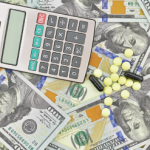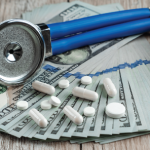Several years ago, we took a family vacation with my mother in Greece. My mother, like many patients, managed to forget to bring all of her medications and did not mention this oversight until we had been traveling for several days. Fortunately, we found a pharmacy in Sparta that was able, with the help of pictures, to figure out what medications my mother needed. We were all surprised at how inexpensive the medications, including a number of brand-name drugs, were and my mother took full advantage of this situation to obtain several months’ worth of her medications. Indeed, my mother was so enthusiastic over her bargains that she began thumbing through the pictures in the pharmacist’s catalog asking whether various cheap drugs could help her. We finally put a stop to her shopping frenzy when she asked whether the cyclophosphamide pills that cost practically nothing would be good for her hypertension.
The high cost of drugs in this country should be corrected not by reform of the healthcare system but by appropriate trade agreements.
Inequitable Economics of Drugs
If nothing else, this incident illustrates an ongoing irritant for many Americans. Why do we pay so much more for our medications than people pay abroad? Given the difference in prices, the purchase of drugs from Canada is even encouraged by some states to reduce their costs. The obvious and conventional explanation for this price differential is that countries with a central purchasing mechanism—and therefore built-in economies of scale—have much more clout in negotiating prices with the pharmaceutical industry than the United States, where no single entity negotiates the price of drugs. The single-party payers of the industrialized world have another negotiating advantage: as arms of the government, they can also threaten to take away the patent protection for any new drugs. Not selling the drugs at a price that health agencies are willing to pay would deprive their citizens of potentially life-saving interventions and trigger an “emergency” elimination of patent protection so that cheaper generic versions of the drug could be quickly brought to market.
Developing new drugs is an expensive undertaking and not for the faint of heart. Only a small minority of agents successfully makes its way from the laboratory to the clinic. Patent protection with the exclusive right to sell a specific agent over a defined period of time permits the pharmaceutical industry to recoup its development costs and invest in the next potential drug. Thus, limiting the selling price of a new drug in an entire country pushes the pharmaceutical industry to make up for this sales cap where it can. This place is the largely unregulated market of the United States. The clear implication of this analysis is that drug development (and pharmaceutical profit) is largely funded by the patients (taxpayers) of the United States, a clear subsidy for other countries.
Most Americans are willing to subsidize the price of life-saving drugs for patients in poor countries (e.g., AIDS drugs for Africa), but I doubt that many Americans would be so sanguine about underwriting the cost of weight-loss drugs for obese Europeans or antidepressants for the Japanese. Nonetheless, American citizens do subsidize the drug development process by paying disproportionately high prices for drugs. And the subsidy for drug development flows not just to American companies but to European and Asian pharmaceutical companies as well.

Rebalancing the Drug Scales
The American consumers’ (and taxpayers’, too, through the National Institutes of Health) subsidy of the world’s drug development costs clearly contributes to the disparity in spending on healthcare in the United States and is an obvious target for reform. Nonetheless, the high cost of drugs in this country should be corrected not by reform of the healthcare system but by appropriate trade agreements. It is hard to imagine that the industrialized countries will be happy to see the end of the subsidy that Americans provide for their people, but the U.S. economy no longer has the ability to subsidize the world’s consumption of pharmaceuticals.
If the U.S. government were to take up this imbalance and impose a solution that benefitted the American consumer, it should be revenue neutral for the pharmaceutical industry. It would be naive to assume that the pharmaceutical industry would voluntarily lower its prices for American consumers in response to a rebalancing of the cost burden for drugs in the United States. The pharmaceutical industry has rightly been reviled for its pricing and marketing practices in the United States, and is not known for its generosity to the American consumer either. So a change in the way that drugs are priced and purchased in the United States should be the quo for the quid provided by federal trade negotiations.
Getting a great price on my mother’s medications was only one of the many pleasures we all shared during our trip to Greece. Indeed, visiting the sites where so much of our culture began deeply impressed my entire family. As a physician, I enjoy knowing that our profession has roots in Greece and that we still take the oath of Hippocrates that originated in this country in the fourth century B.C. Nonetheless, it seems to be a particularly human failing to desire to improve even those things that seem complete already. Indeed, as my mother noted on visiting the Acropolis in Athens, that “they could do so much with this place if they only fixed it up a bit.” Unfortunately, I think that the people of Greece will have the same reaction to my mother’s suggestion as they will to my modest proposal for cutting the cost of medical care in the United States.
Dr. Cronstein is the Paul R. Esserman Professor of Medicine and director, Clinical and Translational Science Institute, New York University School of Medicine in New York.


